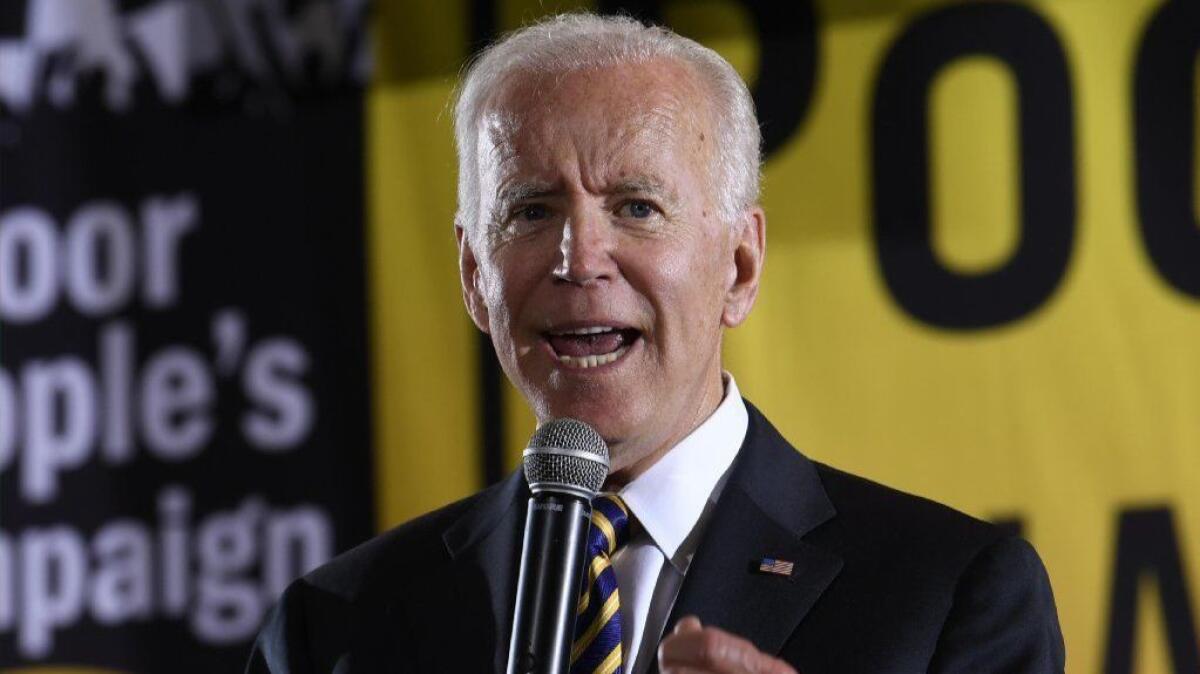Sorry, internet, Biden is right. We need to compromise, even with people with hateful views

- Share via
The nearly two dozen Democratic presidential candidates going through the winnowing fan face not just the traditional scrutiny from party officials, donors and the media but also the sharp edges of a more recent phenomenon: the “call-out culture” of the internet. And the candidate most ripe for calling out appears to be former Vice President (and current front-runner) Joe Biden, a voluble and gaffe-prone pol with decades’ worth of speeches, stances and votes.
This week, Biden put himself in the call-out crosshairs with his comments about working with senators with whom he disagreed. Speaking to a group of donors in New York on Tuesday, Biden argued that this sort of open-mindedness is crucial; otherwise, elected officials with divergent ideologies would never find a way to get things done.
This seems like a no-brainer, but some critics leaped on the way the native Pennsylvanian and longtime senator from Delaware illustrated his point: by noting his ability to forge a civil working relationship with segregationist Democrats from the Deep South, including James O. Eastland of Mississippi and Herman E. Talmadge of Georgia.
That was, in itself, too much for some commentators online. But Biden dug a deeper hole for himself by saying of Eastland, “He never called me ‘boy,’ he always called me ‘son.’” That familiarity was supposedly a sign of how famously the two men got along, yet to some, such as Jamil Smith, it implied that Biden abided the intolerable beliefs that Eastland held on race.
Smith’s view was echoed widely online. What he is arguing, though, is that elected officials can’t do anything with fellow lawmakers whose positions are horribly wrong on one issue or another (although, granted, segregationists were in a class by themselves). If that were the rule, Congress would be in a permanent state of paralysis — Republicans wouldn’t work with Democrats who supported abortion rights, Democrats wouldn’t work with Republicans who supported separating migrant parents from their children at the border, and so on.
The reality is, good legislators find a way to work with political opponents to produce results they all want. True compromise doesn’t mean meeting halfway on segregation. It’s not about trading away principles. Most often in Washington, it means this: People who disagree vehemently on Issue X working together on Problem Y. And when those people disagree on how to solve Problem Y, it means searching for whatever common ground they can find.
The farther one moves from the political center, the less support you find for the notion of compromise — and the more you find it mischaracterized as a betrayal of principles. This sort of ideological rigidity is reinforced by the merciless judgments of call-out culture, which seems to greet any deviation from the orthodoxy as apostasy.
Witness the pile-on that ensued after former Rep. Beto O’Rourke (D-Texas) joked in an Iowa coffee shop that his wife was raising their children “sometimes with my help.” Or the flak that South Bend, Ind., Mayor Pete Buttigieg took after CNBC resurrected a 2015 speech in which he used the phrase “All lives matter.” Or the bruising Biden took first for supporting the Hyde amendment (which bars federal funds from being spent on abortion), then for reversing his position.
Biden’s flip-flop on the Hyde amendment was embarrassing. Not so his position on working with unenlightened lawmakers.
It’s worth noting two signs of progress the Senate made this week on some of the most divisive issues of the day. First, the Senate Appropriations Committee announced a bipartisan deal on roughly $5 billion in emergency funding the Trump administration sought to deal with the influx of migrants at the southern border. Then the leaders of the Senate Health, Education, Labor and Pensions Committee revealed a new, bipartisan bill (S 1895) to end surprise medical bills, reduce prescription drug costs and make several other improvements in the health-care system.
This is the very sort of behavior Biden was touting, minus the segregationists.
Enter the Fray: First takes on the news of the minute »
More to Read
A cure for the common opinion
Get thought-provoking perspectives with our weekly newsletter.
You may occasionally receive promotional content from the Los Angeles Times.










